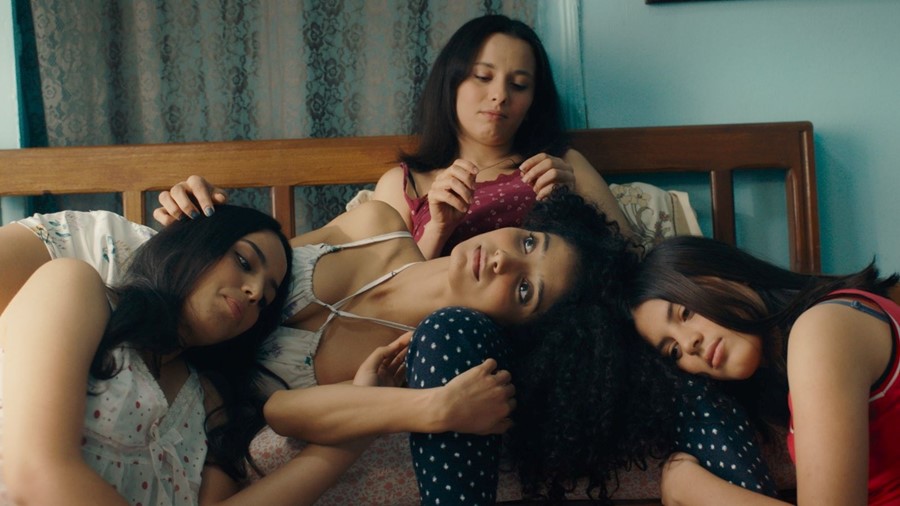Tunisian filmmaker Kaouther Ben Hania explains the story behind her Oscar-nominated new docudrama Four Daughters – a nuanced portrait of motherhood, radicalism, and unchecked generational trauma
How do you tell a story about Islamic extremism in our current socio-political climate, without fuelling Islamophobia? This is the question that came to mind when I read the synopsis for Tunisian filmmaker Kaouther Ben Hania’s new docudrama. “The strength of cinema is that we can go beyond stereotypes,” she tells me, days before the 2024 Oscars, where she’s nominated in the Best Documentary category for Four Daughters – the true story of a Tunisian woman whose two eldest daughters were radicalised by Isis. “We have time to develop and portray the complexities of a human experience.”
Ben Hania proves just this in the film, which is shot in a surreal meta-fictional reenactment format, mixing memory and confessionals. She takes us into the worlds of Olfa Hamrouni and her youngest daughters, Eya and Tayssir, as they revisit the trauma that seeped into their lives when the family’s eldest daughters, Ghofrane and Rahma Chikhaoui, fled home to join Isis in Libya in 2015. Some scenes are reenacted by Eya and Tayssir, who are now in their late teens, alongside actors Ichraq Matar and Nour Karoui who, draped in niqabs, stand in as Ghofrane and Rahma. Hamrouni herself is also replaced with a double, played by the Tunisian-Egyptian actor Hend Sabri.
Ben Hania first started working on the film in 2016, after seeing Hamrouni all over the news in Tunisia. Grieving and angry, she was calling out the Tunisian government for allowing Isis to infiltrate the country, and demanding their help in returning her daughters, who had been gone for a year at the time.
Hamrouni’s story spans both the Arab Spring and the Tunisian Revolution; a 28-day campaign of civil resistance in late December 2010 which led to the ousting of the country’s longtime dictator, Zine El Abidine Ben Ali in January 2011. In the film, Hamrouni explains that during Ben Ali’s reign, wearing the hijab and niqab became an act of resistance in Tunisia, as it was illegal to do so in state buildings. When he was ousted, the country was democratised, with both secular and Islamic groups competing to govern. The change opened up a new set of problems, with divisive debates about the role of Islam in politics. Extremist groups soon made their way into neighbourhoods, where families like Hamrouni’s lived, radicalising young men and women. By 2014, thousands of young Tunisians had fled the country to join Isis in Libya, Syria and Iraq.
Ghofrane was the first of Hamrouni’s daughters to flee, with Rahma following her sister shortly after. The film revisits the family’s horror at the events, highlighting the gut-wrenching pain many mothers like Hamrouni have faced. “My job as a filmmaker was never to judge these women, it was to tell their story,” Ben Hania explains. “There are so many themes in this film; it goes beyond anything black and white… I want the audience to make up their own minds. But I do hope that they can see the importance of empathy.”
Ben Hania admits her first attempt at creating the film didn’t feel right. It was shot as a standard verité documentary shortly after she had reached out to Hamrouni back in 2016, but both women agreed that it lacked the necessary emotional depth. Years went by, with Ben Hania focusing on other projects like her 2020 feature The Man Who Sold His Skin, which was nominated for a Best International Feature Oscar. In the meantime, Hamrouni, Eya and Tayssir worked through their trauma in therapy, staying in close contact with Ben Hania before reshooting Four Daughters in 2021 — this time in the film’s current format, which acts as a cathartic outlet for the family to unpack their individual experiences. At one point, when revealing an incident with her mother’s predatory live-in boyfriend, Tayssir breaks out of character to assure a concerned crew that she is OK, having worked through the trauma in therapy. In another scene, she admits to her mother that she once envisioned strangling her for her harsh punishments, to which Hamrouni looks visibly shocked. These scenes are played out alongside more loving footage, highlighting the strength of Hamrouni’s bond with Eya and Tayssir, who share regular moments of affection.
“I want the audience to make up their own minds. But I do hope that they can see the importance of empathy” – Kaouther Ben Hania
“By the time we were shooting, I had known them closely for over five years so there was a level of comfort and familiarity,” Ben Hania says. “There is a lot of psychology, intimacy and trauma attached to this film, we had to work through that and also make sure that we kept our production crew as small as possible so there weren’t a lot of people running around when reliving such sensitive moments.”
The film never gives a concrete answer to why Ghofrane and Rahma left. Instead, Ben Hania hints at what pushed them down the path of extremism, exploring the familial, societal and political state of their environment, alongside the powerful force of unchecked generational trauma. Today, the two sisters, and Ghofrane’s eight-year-old daughter, Fatma, who was born in captivity, are currently still imprisoned in Libya. Hamrouni continues to pressure the Tunisian government to repatriate them, with the support of Ben Hania and her team. They hope that this documentary will help the case.
Four Daughters is out in the UK now
